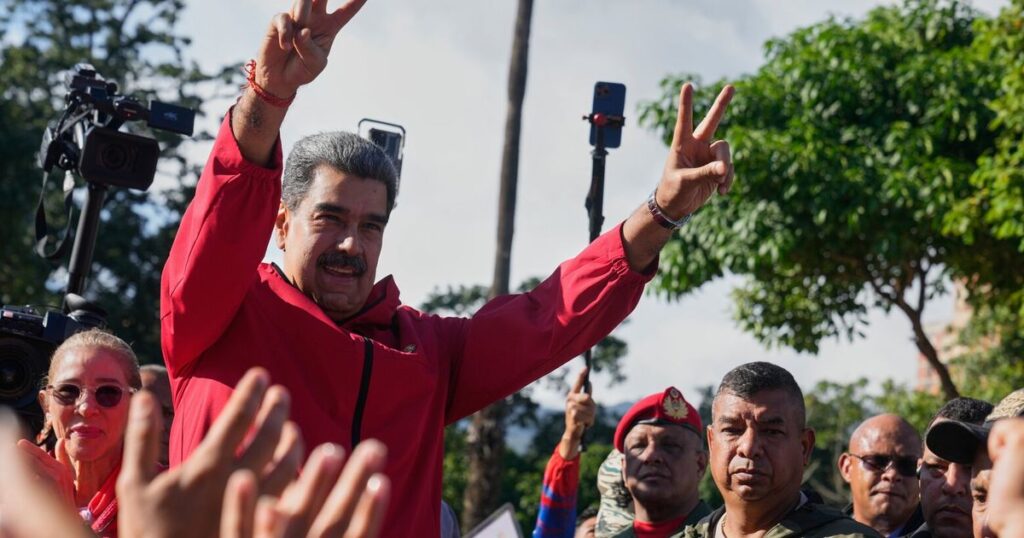WASHINGTON — The Trump administration has secretly authorized the CIA to conduct covert action in Venezuela, according to U.S. officials, stepping up a campaign against Nicolás Maduro, the country’s authoritarian leader.
The authorization is the latest step in the Trump administration’s intensifying pressure campaign against Venezuela. For weeks, the U.S. military has been targeting boats off the Venezuelan coast it says are transporting drugs, killing 27 people. U.S. officials have been clear, privately, that the end goal is to drive Maduro from power.
The new authority would allow the CIA to carry out lethal operations in Venezuela and conduct a range of operations in the Caribbean.
The agency would be able to take covert action against Maduro or his government either unilaterally or in conjunction with a larger military operation. It is not known whether the CIA is planning any operations in Venezuela or if the authorities are meant as a contingency.
But the development comes as the U.S. military is planning its own possible escalation, drawing up options for President Donald Trump to consider, including strikes inside Venezuela.
The scale of the military buildup in the region is substantial: There are currently 10,000 U.S. troops there, most of them at bases in Puerto Rico, but also a contingent of Marines on amphibious assault ships. In all, the Navy has eight surface warships and a submarine in the Caribbean.
The new authorities, known in intelligence jargon as a presidential finding, were described by multiple U.S. officials who spoke on the condition of anonymity to discuss the highly classified document.
Trump ordered an end to diplomatic talks with the Maduro government this month as he grew frustrated with the Venezuelan leader’s failure to accede to U.S. demands to give up power voluntarily and the continued insistence by officials that they had no part in drug trafficking.
The CIA has long had authority to work with governments in Latin America on security matters and intelligence sharing. That has allowed the agency to work with Mexican officials to target drug cartels. But those authorizations do not allow the agency to carry out direct lethal operations.
The Trump administration’s strategy on Venezuela, developed by Secretary of State Marco Rubio, with help from CIA Director John Ratcliffe, aims to oust Maduro from power.
Ratcliffe has said little about what his agency is doing in Venezuela. But he has promised that the CIA under his leadership would become more aggressive. During his confirmation hearing, Ratcliffe said he would make the CIA less averse to risk and more willing to conduct covert action when ordered by the president, “going places no one else can go and doing things no one else can do.”
The White House and the CIA declined to comment.
The United States has offered $50 million for information leading to Maduro’s arrest and conviction on U.S. drug trafficking charges.
Rubio, who also serves as Trump’s national security adviser, has called Maduro illegitimate, and the Trump administration describes him as a “narcoterrorist.”
Maduro blocked the government that was democratically elected last year from taking power. But the Trump administration’s accusations that he has profited from the narcotics trade and that his country is a major producer of drugs for the United States have been debated.
The administration has asserted in legal filings that Maduro controls a criminal gang, Tren de Aragua. But an assessment by U.S. intelligence agencies contradicts that conclusion.
While the Trump administration has publicly offered relatively thin legal justifications for its campaign, Trump told Congress that he decided the United States was in an armed conflict with drug cartels it views as terrorist organizations. In the congressional notice late last month, the Trump administration said the cartels smuggling drugs were “nonstate armed groups” whose actions “constitute an armed attack against the United States.”
White House findings authorizing covert action are closely guarded secrets. They are often reauthorized from administration to administration, and their precise language is rarely made public. They also constitute one of the rawest uses of executive authority.
Select members of Congress are briefed on the authorizations, but lawmakers cannot make them public, and conducting oversight of possible covert actions is difficult.
While U.S. military operations, like the strikes against boats purportedly carrying drugs from Venezuelan territory, are generally made public, CIA covert actions are typically kept secret. Some, however, like the CIA operation in which Navy SEALs killed Osama bin Laden in 2011, are quickly made public.
The agency has been stepping up its work on counternarcotics for years. Gina Haspel, Trump’s second CIA director during his first administration, devoted more resources to drug hunting in Mexico and Latin America. Under William J. Burns, the Biden administration’s director, the CIA began flying drones over Mexico, hunting for fentanyl labs, operations that Ratcliffe expanded.
The covert finding is in some ways a natural evolution of those antidrug efforts. But the CIA’s history of covert action in Latin America and the Caribbean is mixed at best.
In 1954, the agency orchestrated a coup that overthrew President Jacobo Árbenz of Guatemala, ushering in decades of instability. The CIA-backed Bay of Pigs invasion of Cuba in 1961 ended in disaster, and the agency repeatedly tried to assassinate Fidel Castro. That same year, however, the CIA supplied weapons to dissidents who assassinated Rafael Leónidas Trujillo Molina, the authoritarian leader of the Dominican Republic.
The agency also had its hands in a 1964 coup in Brazil, the death of Che Guevara and other machinations in Bolivia, a 1973 coup in Chile, and the contra fight against the leftist Sandinista government of Nicaragua in the 1980s.

